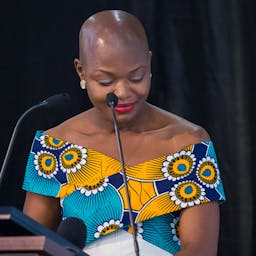Lagos State Sets the Pace in Inclusivity of Persons with Disabilities in Policy Making in Nigeria
Jan 21, 2015
Story
The Lagos State government demonstrated its interest in the welfare of people with disabilities (PWD) when it created the Special Peoples bill in 2010 and passed it into law in 2011 even though many of the rights people with disability are entitled to according to this law are still light years away from reality.
For instance, PWDs in the state still do not have free access to health care facilities as proposed under the law. This has affected the overall wellbeing of this marginalized population especially with respect to the sexual and reproductive health of women with disabilities and it has contributed in no small measure to the non participation of this group in mainstream society.
It was unanimously agreed that the decision to call all stakeholders to a two days meeting where issues that PWDs face when trying to access healthcare facilities in the state and current best practices abroad would be discussed is another step in the right direction.
This meeting, which was organized by the State Accountability and Voice Initiative (SAVI)in partnership with Disability Policy and Advocacy Initiative (DPAI), Treasureland Health Builders Initiative (THB) and Initiative for Women with Disabilities (IWD) took place on the 1st and 2nd of August at the Diplomat Hotel, Ikeja Lagos.
The Executive Directors of organizations dedicated to advocacy and promotion of the rights of PWDs, experts on the rights of persons with disabilities, medical practitioners, parents of children with mental and learning impairments, representatives from the state government were some of those in attendance.
Some people with disabilities had the opportunity of sharing their first hand experience when they tried to access healthcare facilities in the state.
For instance, Deaconess Beyioku Alase Adedoyin, who is hard of hearing and the National president for Deaf Women Association of Nigeria, and Mrs Theresa Matthews who is visually impaired and the woman leader for the Joint Association of Persons with Disabilities (JONAPWD) recounted their sad and humiliating experiences when they went to the hospital to seek medical attention. They both said they were directed from one department to another, which were not related to the services, they sought. That experience they said left them traumatized and feeling discriminated against.
Another woman, Mrs Abigail Turkson who has a physical disability said she had her last baby at home because she was denied adequate healthcare at a General Hospital in Lagos while pregnant.
Mr Theocracy Edafe Toofan, the Chief Executive Director of Special Quest Production who also trains medical practitioners in American Sign Language (ASL) identified some other problems that hinder accessibility of PWDs to adequate healthcare facilities in developing countries.
Some of these reasons where:
The lack of a proper definition of disability,
Traditional views of disability, which portrays it in a negative way,
Lack of proper documentation and survey and
Poor service infrastructure.
Another pressing issue he pointed out that affects persons with hearing impairment when they try to access healthcare facilities is lack of professionally trained medical interpreters. For example, while other interpreters may not be able to convey explanations, the names and dosage of medications from the doctor to the patient in medical terms, trained medical interpreters are able to interpret with very little room for error.
A breach in interpretation can cause a serious error in judgement, mismanagement of patients and sever and other disability causing side effects he adds.
Mr Emmanuel Owoyemi, the Chief Executive Officer of Mental Health Foundation, a not-for-profit organization based in Lagos described in vivid terms a growing concern in Nigeria is; mental illness.
It is suspected that 4 in every 10 person suffers from a form of mental illness. This sum up to 64million Nigerians.
There are only one hundred and sixty psychiatrists, this sum up to, 1.2million people to one psychiatrist.
It gets even worse as there are only 34 neurosurgeons presently.
To close this epoch making meeting, Dr Ogunmusi Peter who represented the Nigerian Medical association assured all aggrieved that the association has recently began strict discipline of all doctors who fall short of the ethics guiding the medical profession.
Mrs Adenike Glenn who is the service improvement officer for the Ministry of health reassured everyone especially PWDs in Lagos State by showing them provisions that have been made to include them in the provision of adequate healthcare and quality service from medical personnel in the Lagos State Service Charter.
A committee was then set up to work hand in hand with the Lagos State government in drafting and monitoring the new all-inclusive healthcare policy.
While the efforts of the State government is commendable, I cannot help but wonder if this is another one of those political talks designed for one purpose alone; to suck PWDs into the illusion that the government truly has their interest at heart while pacifying their agitations or if the State is truly going to make good on its promise as stated in the Special Peoples Law of 2011.




